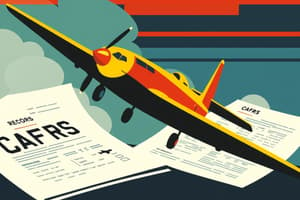Podcast
Questions and Answers
What is the primary responsibility of the Flight Lead (FL) in a military aircraft flight?
What is the primary responsibility of the Flight Lead (FL) in a military aircraft flight?
- Being the secondary planner and alternate decision maker
- Maintaining formation position and visual lookout
- Engaging in combat if practical
- Being the primary planner and decision maker (correct)
Which radio is used for intraflight communication in military flying?
Which radio is used for intraflight communication in military flying?
- VHF radio (COMM2) (correct)
- UHF radio (COMM1)
- Both UHF radio and VHF radio
- None of the above
What is the purpose of using hand signals in real military aviation?
What is the purpose of using hand signals in real military aviation?
- To minimize radio communication (correct)
- To ensure clear and consistent communication
- To replace all radio communication
- To increase situational awareness (SA)
Flashcards
Flight Lead (FL)
Flight Lead (FL)
The pilot who leads a military aircraft flight of four.
The 3 C’s
The 3 C’s
Clear, Concise, and Consistent communication standards adhered to in military aviation.
Element Lead (EL)
Element Lead (EL)
The pilot who is the secondary planner and alternate decision maker, attached to aircraft #4.
Study Notes
Flight Anatomy and Communication Procedures in Military Aviation
- A military aircraft flight consists of four aircraft, led by the Flight Lead (FL) who is #1, with #2 as a wingman attached to #1, and #3 as the Element Lead (EL) attached to #4.
- The flight can be further divided into elements resulting in two two-ship formations, and the whole flight is identified by a callsign, e.g. Lucky 1-1.
- Responsibilities in a flight are divided between the FL and the wingmen, with the FL being the primary planner and decision maker, while the wingmen focus on tasks that require high situational awareness (SA).
- Each flight member has assigned responsibilities, with #1 being the primary navigation and radar lookout, #2 maintaining formation position and visual lookout, #3 being the secondary planner and alternate decision maker, and #4 maintaining formation position and visual lookout for the flight.
- Communication within a flight and with the outside world is crucial in military flying, with the UHF radio (COMM1) used for communication with the outside world and the VHF radio (COMM2) used for intraflight communication.
- The 3 C’s (Clear, Concise, Consistent) are adhered to for clear and consistent communication, with wingmen mostly responding back their flight number to let the FL know they copied their transmission/order, unless required otherwise.
- Hand signals are commonly used in real military aviation to minimize radio communication, but in flight simulators, calls are used instead.
- The FL is mostly busy with navigation and managing the mission tasks, while the wingmen focus on maintaining formation integrity and checking the FL’s surroundings.
- The EL has to conform to any calls made by the FL, and the wingmen have to follow any and all instructions given to them.
- The FL can choose to use the second element in any way he sees fit for the mission, and once the second element becomes detached, the EL will be leading the formation for him (#3) and #4.
- The callsign consists of a name and 2 numbers, with the first number being the number of the entire flight and the second number referring to the place in the formation.
- Flight member responsibilities are divided to ensure each pilot has a manageable number of tasks to perform, and they are responsible for maintaining mutual support of the flight and engaging in combat if practical.
Studying That Suits You
Use AI to generate personalized quizzes and flashcards to suit your learning preferences.




